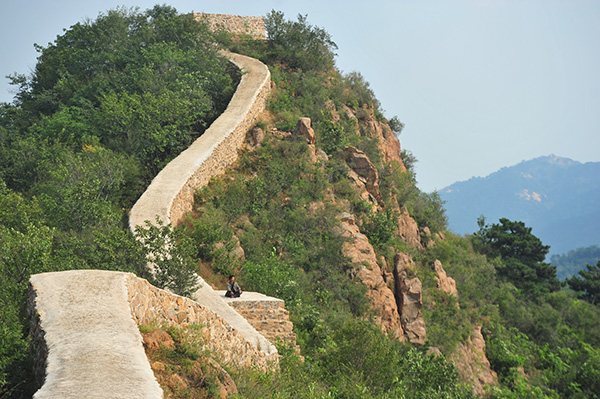|
 A section of the Great Wall was repaired in Suizhong county, Liaoning province, with what officials said was sand. But critics of the work said it was cement. zhang Shiyao / For China Daily |
The renovation of a 700-year-old stretch of the Great Wall in Suizhong county in southwest Liaoning province has triggered a public outcry and scrutiny over claims of poor workmanship.
The little-known Xiaohekou section, which has a reputation among hikers as the most beautiful original Great Wall, is a nationally protected cultural relic. The restoration occurred in 2014 and drew public attention after someone recently posted photos online.
In the photos, the wall appears to have been covered in a smooth, white material. Local authorities say it's sandy soil.
But netizens thought it looked like cement, which seemed to destroy its original beauty and its status as a cultural relic.
Liu Fusheng, a local resident who claimed to climb the Xiaohekou section every day, said construction workers used cement mixed with white dust and sandy soil to flatten the walkway into a smooth surface, Beijing News reported on Wednesday.
However, local authorities said that sort of speculation was inaccurate.
The cultural relics protection bureau of Suizhong county said the repair was an emergency project because the section might have collapsed in heavy rain. It said that the material used was sandy soil, not cement.
The Liaoning provincial culture department also said the section had been in grave danger of being ruined by a natural disaster, such as a flood, so urgent project was undertaken to lay a protective cover on severely damaged areas.
According to the department, the restoration work extends eight kilometers.
Some sections were repaired; others were rein-forced, it said. In the section shown on the internet, about 2 km long, only some protective work was done, it said.
"There is no wall left in this section, only the stone foundation, which is badly damaged. The experts' suggestion was to put the original stones back and put a very thin cover on it for protection from dust and water," department spokesman Yang Shitao said.
Dong Yaohui, deputy direct-or of the China Great Wall Society, said one reason for the controversy is that there is no general standard for restoring the wall. He suggested that any repair should respect the current status of the wall, Beijing News reported.
According to the society, natural and human damage to the Great Wall over the past 2,000 years has jeopardized it. For example, the Ming Dynasty section, built between 1 368 and 1644 - the youngest part of the Great Wall - has only 513.5 km of intact structure, 8 percent of the full 6,259.6 km length.
